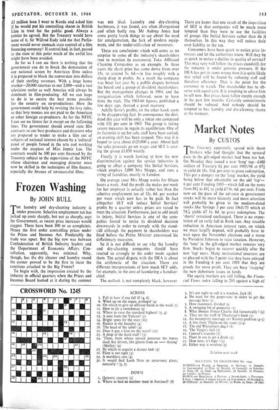Frozen Washing
By JOHN BULL
To begin with, the impression created by the industry in official quarters when the Prices and Incomes Board looked at it during the summer was not ideal. Laundry and dry-cleaning businesses, it was found, are often ill-organised .and often badly run. Mr Aubrey Jones had some pretty harsh things to say about the need for amalgamation, the lack of modern equip- ment, and the under-utilisation of resources.
These are conclusions which will come as no surprise to some of the industry's shareholders (not to mention its customers). Take Affiliated Cleaning Companies as an example. In three years the share price has come down from over 15s. to around 3s. 6d.-in line roughly with a sharp drop in profits. As a result the company was beset last year by a public dispute between the board and a group of dissident shareholders. But the management changes in 1964, and the reorganisation which followed, seem to have done the trick. The 1965-66 figures, published a few days ago, showed a good recovery.
Achille Serre's profits, on the other hand, seem to be disappearing fast. In consequence the divi- dend this year will be only a token one compared with 13+ per cent in 1965. The group is taking severe measures to regain its equilibrium. One of its factories is up for sale, staff have been sacked, an evening shift has been stopped. This way it is hoped to save about £125,000 a year. About half the sales proceeds go on wages and SET is cost- ing the group £1,850 weekly.
Finally it is worth looking at how the new discrimination against the service industries is going to affect a company like Initial Services, which employs 5,000 Mrs Mopps, and runs a string of laundries, mostly in London.
On average your Mrs Mopp works for fifteen hours a week. And the profit she makes per week for her employer is actually rather less than the selective employment tax of 12s. 6d. per worker per week which now has to be paid. In fact altogether SET will reduce Initial Services' profits by a quarter unless prices are raised to meet the situation. Furthermore, just to add insult to injury, Initial Services is ohe of the com- pahies forced to revise its dividend decision downwards in order to comply with the stand- still although the payment to shareholders was fixed before the Prime Minister announced his deflationary measures.
So it is not difficult to see why the laundry and dry-cleaning companies should have reacted so strongly to the order made against them. The actual dispute with the DEA is about the arithmetic of the situation. There are different interpretations of how much SET adds, for example, to the cost of laundering a handker- chief.
The outlook is not completely black, however. There are hopes that one result of the imposition of SET is that companies will be much more tempted than they were to use the facilities of groups like Initial Services rather than do it themselves. In this way they will reduce their own liability to the tax.
Consumers have been quick to notice price in- creases and let the authorities know. Will they be as quick to notice a decline in quality of service?, This may very well follow the prices standstill, for the industry is under genuine pressure. If the DEA has got its sums wrong then it is quite likely that relief will be found by reducing staff and therefore efficiency. That is the point for the customer to watch. The shareholder has to ob- serve with equal care. It is tempting to advise him to sell now. But prices have fallen steeply enough in the past few months. Certainly commitments should be reduced. And nobody should be tempted to buy laundry and dry-cleaning shares at the moment.






































 Previous page
Previous page